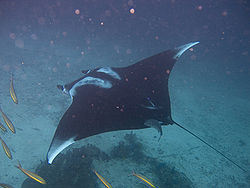
Punga (mythology)
Encyclopedia

Maori mythology
Māori mythology and Māori traditions are the two major categories into which the legends of the Māori of New Zealand may usefully be divided...
, Punga is a supernatural being, the ancestor of shark
Shark
Sharks are a type of fish with a full cartilaginous skeleton and a highly streamlined body. The earliest known sharks date from more than 420 million years ago....
s, lizard
Lizard
Lizards are a widespread group of squamate reptiles, with nearly 3800 species, ranging across all continents except Antarctica as well as most oceanic island chains...
s, ray
Batoidea
Batoidea is a superorder of cartilaginous fish commonly known as rays and skates, containing more than 500 described species in thirteen families...
s, and all deformed, ugly things. All ugly and strange animals are Punga's children. Hence the saying Te aitanga a Punga (the offspring of Punga) used to describe an ugly person. Punga is a son of Tangaroa
Tangaroa
In Māori mythology, Tangaroa is one of the great gods, the god of the sea. He is a son of Ranginui and Papatuanuku, Sky and Earth. After he joins his brothers Rongo, Tūmatauenga, Haumia, and Tane in the forcible separation of their parents, he is attacked by his brother Tawhirimatea, the god of...
, the god of the sea, and when Tāwhirimātea
Tawhirimatea
In Māori mythology, Tāwhirimātea is the god of weather, including thunder and lightning, wind, clouds and storms. He is a son of Papatūānuku and Ranginui...
(god of storms) made war against his brothers after they separated Rangi and Papa
Rangi and Papa
In Māori mythology the primal couple Rangi and Papa appear in a creation myth explaining the origin of the world. In some South Island dialects, Rangi is called Raki or Rakinui.-Union and separation:...
(sky and earth), the two sons of Punga, Ikatere and Tū-te-wehiwehi, had to flee for their lives. Ikatere
Ikatere
In Māori & Polynesian mythology, Ika-tere or Ikatere is a fish god, the father of all the sea creatures including mermaids. He is a son of Punga and his brother is Tū-te-wehiwehi....
fled to the sea, and became the ancestor of certain fishes, while Tū-te-wehiwehi
Tū-te-wehiwehi
In Māori mythology, Tū-te-wehiwehi is the father of all reptiles. He is a son of Punga and brother of Ikatere....
took refuge in the forest, and became the ancestor of lizards.
As is appropriate for a son of Tangaroa, Punga's name has a maritime origin - in the Māori language, 'punga' means 'anchor stone' - in tropical Polynesia
Polynesia
Polynesia is a subregion of Oceania, made up of over 1,000 islands scattered over the central and southern Pacific Ocean. The indigenous people who inhabit the islands of Polynesia are termed Polynesians and they share many similar traits including language, culture and beliefs...
, related words refer to coral stone, also used as an anchor (Craig 1989:219, Tregear 1891:374).
According to some versions, Punga is the son of Rangi-potiki
Rangi and Papa
In Māori mythology the primal couple Rangi and Papa appear in a creation myth explaining the origin of the world. In some South Island dialects, Rangi is called Raki or Rakinui.-Union and separation:...
(father sky) and Papatuanuku (mother earth) and a twin brother to Here. In a version of the epic of Tāwhaki
Tāwhaki
In Māori mythology, Tāwhaki is a semi-supernatural being associated with lightning and thunder.-Genealogy:The genealogy of Tāwhaki varies somewhat in different accounts. In general, Tāwhaki is a grandson of Whaitiri, a cannibalistic goddess who marries the mortal Kaitangata , thinking that he...
attributed by White to the Ngāti Hau
Ngati Hau
Ngāti Hau is a Māori iwi of New Zealand....
tribe, Punga is named as a brother of Karihi
Karihi
In Māori mythology, Karihi is a brother or cousin of TāwhakiIn one story, Hema was killed by the Ponaturi, and Karihi, with his mother and his brother Tāwhaki, killed them all but two in revenge. They tricked the Ponaturi into entering a house, and then locked them in, claiming there was still time...
and Hemā
Hema (mythology)
-Māori:In Māori mythology, hema is a son of Whaitiri and Kaitangata and the father of Tāwhaki and Karihi. In North Island stories, he was killed by the Ponaturi, evil creatures who live by day in the water. Tāwhaki, Karihi and their mother trick the Ponaturi into entering a house, and then locked...
; however, in many versions, he is a cousin of the brothers Karihi and Tāwhaki (Craig 1989:219, Tregear 1891:374, White 1887:95, 125).
Elsewhere in Polynesia
In some HawaiiHawaii
Hawaii is the newest of the 50 U.S. states , and is the only U.S. state made up entirely of islands. It is the northernmost island group in Polynesia, occupying most of an archipelago in the central Pacific Ocean, southwest of the continental United States, southeast of Japan, and northeast of...
an stories, Hema and Puna are sons of Aikanaka and Hinahanaiakamalama (Tregear 1891:374).

